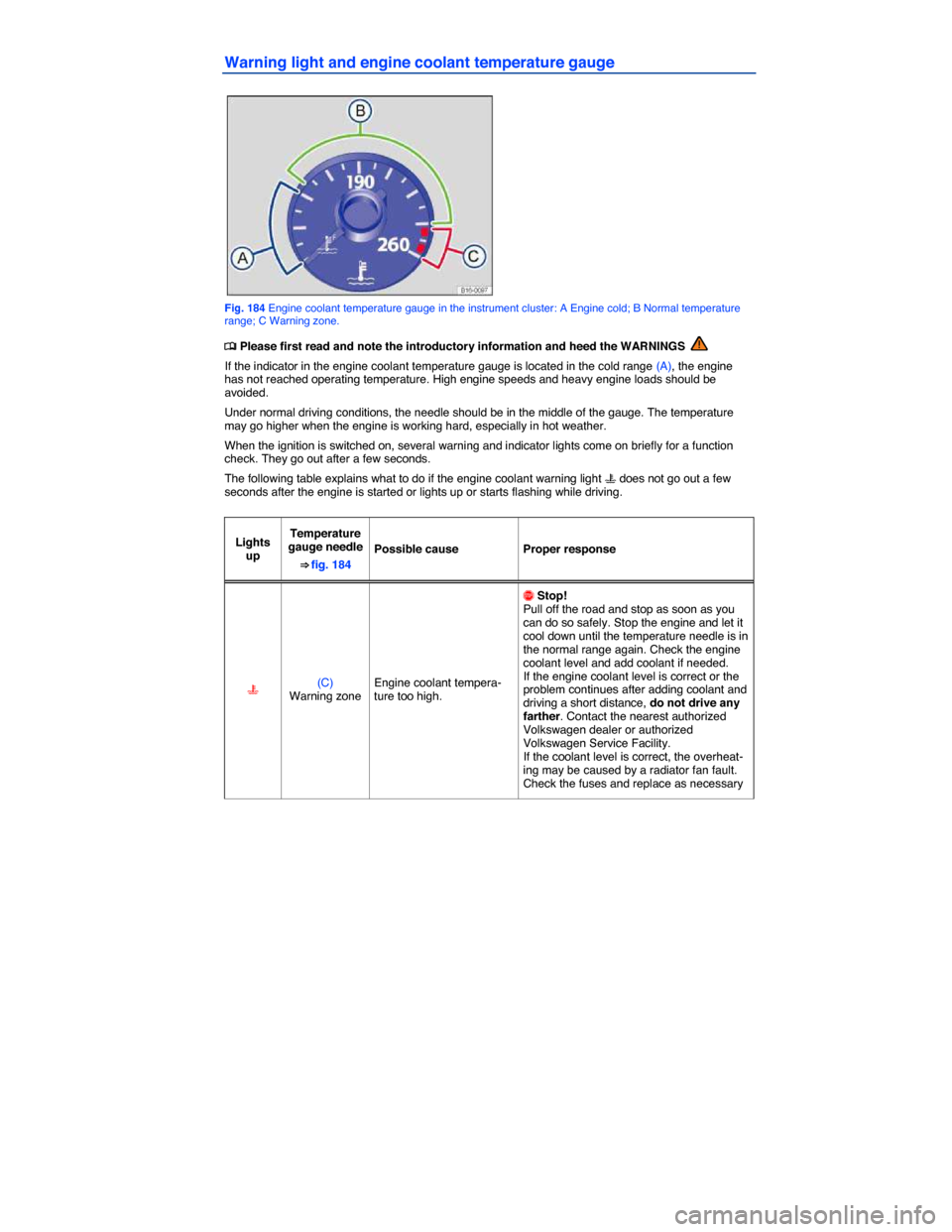2015 VOLKSWAGEN PASSAT Temperature
[x] Cancel search: TemperaturePage 291 of 397

WARNING
Store AdBlue only in its closed original container and in a safe place.
�x To reduce the risk of poisoning, never keep AdBlue in empty food or beverage containers that might mislead someone into drinking from them.
�x Always store AdBlue outside the reach of children.
NOTICE
�x Use only AdBlue that has been explicitly approved by Volkswagen. Using other types of AdBlue can damage your vehicle's engine.
�x Never mix water or any other substances or additives with AdBlue. Damage caused by such additives will not be covered by any Volkswagen limited warranty.
�x Never put AdBlue into the diesel fuel tank! Otherwise the engine may be damaged!
�x Do not carry a refill container in the vehicle all the time or routinely. Due to temperature fluctuations and damage, the container could start leaking and the AdBlue could damage the vehicle interior.
Dispose of the refill container in an environmentally-responsible manner.
Appropriate AdBlue refill containers can be obtained from an authorized Volkswagen dealer or an authorized Volkswagen Service Facility.
Page 294 of 397

WARNING
High voltage systems in the engine compartment can cause electrical shocks or even elec-trocution, severe burns, other serious injuries, and even death!
�x Never short-circuit the electrical system. Be especially careful when using jumper cables. The vehicle's battery could explode!
�x To reduce the risk of electrical shock and personal injury while the engine is running or being started:
– Never touch ignition cables. Never touch other components of the high voltage elec-tronic ignition system.
– Never touch the wiring of the HID – High Intensity Discharge (Xenon) headlights.
�x Read and heed the important information and warnings on cleaning the engine compart-
ment ⇒ page 328
WARNING
Moving parts in the engine compartment can cause serious personal injury on contact.
�x Never reach into the area around or touch the radiator fan. Contact with the blades can cause serious personal injury. Always remember that the radiator fan is temperature-controlled and can come on suddenly even when the engine has been switched off for a while and the key has been removed from the ignition.
�x If you have to perform a check or repair when the engine is running, there are more risks from the rotating parts, such as the drive belts, alternator, radiator fan, etc., and from the high-voltage ignition system. Always use extreme care.
– Always make sure that jewelry, loose clothing and long hair do not get caught in rotat-ing engine parts. Before starting any work remove your jewelry, take off your necktie, tie back and cover your hair, and do not wear clothing that can hang down and get caught in moving engine parts.
– Always use extreme caution if the accelerator pedal has to be depressed to perform a check. The vehicle will start to move even if the parking brake is on.
�x Never leave any objects in the engine compartment, for example cleaning rags and tools. Objects left behind can cause malfunctions, engine damage, and even fires.
WARNING
Additional materials in the engine compartment such as blankets can interfere with the oper-ation of the engine and can cause fires which can lead to serious injuries.
�x Never cover the engine with blankets or other materials.
Page 301 of 397

Volkswagen therefore recommends that you have the engine oil changed by an authorized Volkswagen dealer or an authorized Volkswagen Service Facility.
Engine oil quality is based not only on requirements for engines and exhaust treatment systems, but also on fuel quality. Engine oil comes into contact with fuel and fuel residue in all internal combustion engines, causing engine oil to age and its lubricating qualities to deteriorate.
Your engine was factory-filled with a high-quality, “synthetic” all-season engine oil that meets strict Volkswagen oil quality standards and has a viscosity grade of SAE 5W-40. or SAE 5W-30. You can use this oil for normal driving in all temperatures.
If you need to add oil between oil changes, use only a high quality oil that expressly complies with the Volkswagen oil quality standard specified for your vehicle's engine:
Engines Engine oil specification
Gasoline engines VW 504 00, VW 503 00, VW 502 00
Diesel engines VW 507 00
At the time this Manual was printed, the engine oils available in the U.S. that meet these Volkswagen standards are “synthetic” oils. This does not mean, however, that any “synthetic” engine oil will meet Volkswagen standards. Always use an approved oil that expressly complies with the Volkswagen oil quality standard that applies to your vehicle's engine.
General recommendations:
If “synthetic” oil that meets the applicable Volkswagen oil quality standard with viscosity grade SAE 5W-40 or SAE 5W-30 is not available in your area, be sure to use a viscosity grade suitable for the climate, season, and operating conditions that exist where the vehicle is used. Make sure the oil
meets the quality standard listed in ⇒ table on page 300.
Engine oils are constantly being improved. Authorized Volkswagen dealers and authorized Volkswagen Service Facilities are always up-to-date regarding new developments and changes. Volkswagen therefore recommends that you have the engine oil changed by an authorized Volkswagen dealer or an authorized Volkswagen Service Facility.
NOTICE
�x If you need to add oil and there is none available that meets the Volkswagen oil quality standard your engine requires, you may add a total of no more than 1/2 quart (0.5 liter) of a high-quality “synthetic” oil that meets ACEA A3 specifications and has a viscosity grade of SAE 5W-40 or SAE 5W-30.
�x Use only a high quality engine oil that expressly complies with the Volkswagen oil quality standard specified for your vehicle's engine. Using any other oil can cause serious engine damage that will not be covered by any Volkswagen Limited Warranty.
�x Do not mix any lubricants or other additives into the engine oil. Doing so can cause engine damage! Damage caused by these kinds of additives are not covered by any Volkswagen Limited Warranty.
Engine oil capacities
�
Page 308 of 397

Warning light and engine coolant temperature gauge
Fig. 184 Engine coolant temperature gauge in the instrument cluster: A Engine cold; B Normal temperature range; C Warning zone.
�
Page 309 of 397

Lights up
Temperature gauge needle
⇒ fig. 184
Possible cause Proper response
(B) Normal range Engine coolant level too low.
Check the engine coolant level after the engine has cooled down and add engine coolant if low. If the engine coolant level is correct or the problem continues after adding coolant, do not drive any farther. Contact an author-ized Volkswagen dealer or authorized Volkswagen Service Facility. These instructions apply only when the coolant temperature stays in the normal range. Stop immediately if the needle goes into the red warning zone (C).
– Engine coolant system malfunction.
�
Page 315 of 397

More information:
�x ⇒ Booklet Warranty and Maintenance
�x Preparations for working in the engine compartment
�x Parts, accessories, repairs and modifications
WARNING
Working on the batteries or the electrical system in your vehicle can cause serious acid burns, fires, explosions, or electrical shocks. Always read and heed the following WARNINGS and safety precautions before working on the batteries or the electrical system.
�x Before working on the electrical system, always switch off the ignition and all electrical consumers and disconnect the negative (-) cable from the standard 12 Volt battery.
�x When you change a light bulb, always switch off the light first.
�x Always keep children away from battery acid and vehicle batteries in general.
�x Always wear eye protection. Never let battery acid or lead particles come into contact with your eyes, skin, or clothing.
�x Sulfuric battery acid is very corrosive. It can burn unprotected skin and cause blindness. Always wear protective gloves and eye protection. To reduce your risk of injury, never tilt the batteries, as this could spill acid through the vents and burn you.
�x If you get battery acid in your eyes or on your skin, immediately rinse with cold water for several minutes and then get immediate medical attention. If you swallow any battery acid, get medical attention immediately.
�x When disconnecting the batteries from the vehicle electrical system, always disconnect the negative cable (-) first and then the positive cable (+).
�x Always switch off all electrical consumers before reconnecting 12 Volt batteries. Recon-nect the plus cable (+) first and then the negative cable (-). Never reverse the polarity of the connections. This could cause a fire.
�x A highly explosive mixture of gases is given off when the battery is being charged.
�x Do not smoke and avoid fires, sparks, and open flames when working. Never create sparks or electrostatic charges when handling cables and electrical equipment. Never short circuit the battery terminals. High-energy sparks can cause serious personal injury.
�x Never use or attempt to charge a damaged or frozen battery, or a battery that was frozen but has thawed. Charging a frozen or thawed battery could cause explosions and chemical burns! Replace damaged or frozen vehicle batteries immediately. A dead battery can freeze at temperatures around +32 °F (0 °C).
�x If the battery has a vent line or tube, make sure that it is properly connected to the battery.
�x Always make sure that the vent line is securely attached to a vehicle battery that is located in the luggage compartment.
WARNING
California Proposition 65 Warning
�x Battery posts, terminals, and related accessories contain lead and lead components, chemicals known to the State of California to cause cancer and reproductive harm. Wash your hands after handling.
NOTICE
�x Do not expose the vehicle battery to direct sunlight for an extended period of time as ultra-violet rays may damage the battery housing.
Page 320 of 397

WARNING
When the vehicle battery is charged, it produces highly explosive hydrogen gas.
�x Charge vehicle batteries only in well-ventilated areas.
�x Never charge a frozen or thawed battery. A dead battery can freeze at temperatures around +32 °F (0 °C).
�x You must replace the vehicle battery if it was frozen.
�x Incorrectly connected cables can cause a short-circuit. First connect the positive cable (+) and then the negative cable (-).
NOTICE
�x Never disconnect a vehicle battery or connect 2 vehicle batteries to each other when the ignition is switched on or the engine is running. Using the wrong battery can damage the elec-trical system or electronic components and cause electrical malfunctions.
�x Never use a vehicle battery that does not meet specifications for the vehicle battery for your vehicle . Using the wrong battery can damage the electrical system or electronic components and cause electrical malfunctions.
�x Never connect power generating equipment, such as a solar panel or battery charger, to the
12 Volt socket or the cigarette lighter ⇒ Cigarette lighter in order to charge the vehicle battery. This can damage the vehicle's electrical system.
Dispose of the vehicle battery according to regulations. Vehicle batteries contain poisonous substances such as sulfuric acid and lead.
Battery acid can pollute the environment. Catch leaking operating fluids and dispose of them properly.
Page 323 of 397

WARNING
After the vehicle has been washed, the wet brakes or, in winter, brake discs or pads coated with ice, react slower and need longer stopping distances.
�x Always dry the brakes and clean off any ice coatings with a few careful applications of the brake. Make sure not to endanger other motorists or cyclists or disobey legal requirements.
CAUTION
Sharp edges under the vehicle can cut exposed skin.
�x Always protect your hands and arms from cuts on sharp metal edges when cleaning the underbody, the inside of the wheel housings, etc.
NOTICE
�x The water temperature must not be more than +140 °F (+60 °C).
�x To help prevent damage to the paint, do not wash the vehicle in direct sunlight.
�x Do not use insect sponges, abrasive kitchen sponges or similar things to clean the vehicle. These can damage the paint finish.
�x Never clean headlights with a dry cloth or sponge. Always use a wet cloth or sponge. For best results use soapy water.
�x When washing or rinsing the vehicle in cold weather, do not let water get into the lock cylinders or point the hose at gaps around the doors, hood, or luggage compartment lid. The water could freeze on the locks and seals and make it difficult to open the vehicle!
NOTICE
To help prevent vehicle damage in a car wash:
�x Compare the vehicle track width with the dimensions of the guide rails in the car wash to help prevent damage to wheel rims and tires!
�x Make sure there is enough clearance for the height and width of the vehicle.
�x To help prevent paint damage to the engine hood, place wiper blades against the windshield after they have dried. Do not let them snap back into place.
�x Fold the outside mirrors toward the vehicle body. Do not fold power folding mirrors manual-ly!
�x Lock the luggage compartment lid to prevent unintentional opening in the car wash.
Washing with a power washer
�